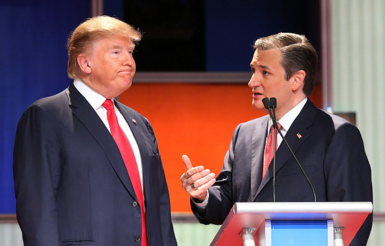The strong presence of outsiders has changed the political landscape of the 2016 election considerably. Strategies that most people would doom to failure have resulted in some amazing successes. Few would have thought you could compete against super PACs with grassroots’ donations, and perhaps fewer would have thought you could get away with even half the stuff Donald Trump says and still earn positive poll numbers.
The enthusiasm with which extreme views on each side of the argument have been received has forced each of the candidates to move their positions further to the left or right in order to compete with these outsiders. Only recently — indeed, perhaps too late — have candidates put their feet in the ground, saying there’s a line they won’t cross, even if it might mean higher poll numbers.
Hillary Clinton won’t ever quite reach Bernie Sanders’s “democratic socialism,” and most of the GOP candidates are trying to keep away from the extreme reactionary dialogue of Trump. However, candidates on both sides still need to appeal to the crowds these outsiders draw.
Sanders’ presence in this election cycle is amazing by itself. He’s a self-proclaimed socialist with a decent chance of getting the nomination if he can snag a little more popularity away from Clinton. Clinton, on the other hand, plays out the role of calculating genius. She made smart decisions as Secretary of State, helping improve our relations with much of the world. She knows how to make the changes that need to happen. But Sanders reminds us of lobbyist entrapment and campaign donors. Through him we’re reminded of the disparity between victims in public shootings and the government’s inability to enforce any sort of reasonable gun control regulations for fear of massive organizations like the NRA. And from this point, Sanders’s more radical call for change seems reasonable and resonates with a lot of people. His stances on income inequality, gun control, climate change, sexism and racism are all similar to Clinton’s. But Sanders’ viciousness toward Wall Street is an argument Clinton isn’t quite willing to approach. Sanders presents himself as a Democrat among Democrats, someone with a powerful personality and a deep desire for change.
Trump’s story is not so different. He propounds that income inequality, gun control, climate change, sexism and racism are indeed problems, though his reasons why are very different. To Trump, income inequality has resulted from the Obama administration’s tax increases and excessive government spending on useless measures, like trying to take away our guns or stop climate change (which we all know is a fake lie that, somehow, has the majority of world leaders fooled). To Trump, modern sexism and racism are the result of liberalism plaguing our national identity with abstractions like social justice that only aim to hamper our way of life. Trump presents himself as a Republican among Republicans, someone with a powerful personality and strong opinions that he’s not afraid to voice.
Both Sanders and Trump voice the frustrations and grievances of the American people in a way that other candidates can’t or won’t. Parading her successes in the Obama administration doesn’t excite the people about Clinton while they pay daily witness to poverty and police violence. And Marco Rubio’s call for reasonable immigration reform sounds blasphemous to Republicans who think illegal immigrants steal their jobs.
While all this talk of change is exciting and interesting, I can’t help but consider the last eight years of the Obama administration. President Obama desired change more than either Clinton or Sanders, yet he was so heavily shackled by the opposition that assigning members of his cabinet became difficult. What was it that made Mitch McConnell say in 2010 that “the single most important thing we want to achieve is for President Obama to be a one-term president?” Surely President Obama saw the growing divide as each party became more and more polarized.
The parties are more polarized than ever thanks to McConnell’s efforts. Democrats are pushing Clinton further and further left, and if she doesn’t budge she may lose the vote to Sanders. Republicans, meanwhile, have Trump at the forefront, whose presence in the 2008 election was regarded mostly as a joke. The election has now become a populist movement where Trump represents the extreme views conservative media has been harboring all these years. Rather than focusing on the economy, the Republican party has instead turned towards expressing their grievances on women’s health, immigration, black skin, Muslims and science.
Our political system is so hopelessly wide that it no longer seems reasonable to vote for a more moderate candidate.


